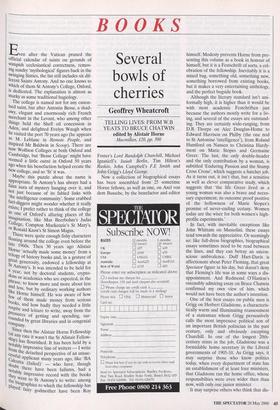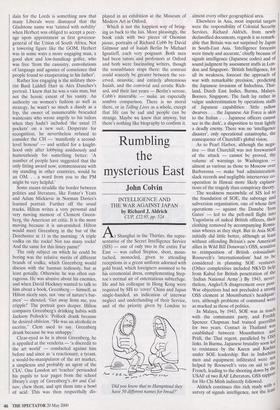BOOKS
Several bowls of cherries
Geoffrey Wheatcroft
TELLING LIVES: FROM W.B YEATS TO BRUCE CHATWIN edited by Alistair Horne Macmillan, £20, pp. 390 Even after the Vatican pruned the official calendar of saints on grounds of wimpish ecclesiastical correctness, remov- ing sundry 'mythological' figures back in the swinging Sixties, the list still includes six dif- ferent Saints Antony. And no one knows to which of them St Antony's College, Oxford, is dedicated. The explanation is almost as murky as some traditional hagiology. The college is named not for any canon- ised saint, but after Antonin Besse, a shad- owy, elegant and enormously rich French merchant in the Levant, who among other things held the Shell oil concession in Aden, and delighted Evelyn Waugh when he visited the port 70 years ago (he appears as M. Leblanc in Remote People, and inspired Mr Baldwin in Scoop). There are now Wolfson Colleges at both Oxford and Cambridge, but 'Besse College' might have seemed a little outré in Oxford 50 years ago when his benefaction helped create the new college, and so 'St' it was. Maybe this puzzle about the name is aPpropriate. St Antony's has always had a faint aura of mystery hanging over it, and not just because of its fabled links with the intelligence community'. Some crabbed fact-diggers might wonder whether it really exists; I prefer rather to think of the college a. 5 one of Oxford's alluring places of the imagination, like Max Beerbohm's Judas College, Compton Mackenzie's St Mary's, or Ronald Knox's St Simon Magus. There were quite enough fishy characters floating around the college even before the late 1960s. Then 30 years ago Alistair HOrne 'actually made some money' from a trilogy of history books and, in a gesture of great generosity, endowed a fellowship at St Antony's. It was intended to be held for a year, not by doctoral students, crypto- dons or academics who are expected, in the phrase, to know more and more about less like less, but by ordinary working authors Ilke Horne himself. He was aware of how few of them made money from serious books, and how badly they needed a little respite and leisure to write, away from the pressures of getting and spending, sur- rounded by great libraries and in congenial c°1npany, Since then the Alistair Home Fellowship (at any rate it wasn't the St Alistair Fellow- ship) has flourished. It has been held by a notably impressive line of writers — I write c..°111 the detached perspective of an unsue- ,-,'ssf1-11 applicant many years ago, like `BA Calcutta (failed)' — who have, though doubt there have been failures, had a they impressive record with the books tuheY Went to St Antony's to write: among Pr biographies to which the fellowship has aye(' fairy godmother have been Roy Foster's Lord Randolph Churchill, Michael Ignatieff's Isaiah Berlin, Tim Hilton's Ruskin, John Campbell's F.E Smith and John Grigg's Lloyd George. Now a collection of biographical essays has been assembled from 25 sometime Horne fellows, as well as one, on Axel von dem Bussche, by the benefactor and editor himself. Modesty prevents Horne from pre- senting this volume as a book in honour of himself, but it is a Festschrift of sorts, a cel- ebration of the fellowship. Inevitably it is a mixed bag, something old, something new, something borrowed from existing books, but it makes a very entertaining anthology, and the perfect bogside book.
Although the literary standard isn't uni- formally high, it is higher than it would be with most academic Festchriften just because the authors mostly write for a liv- ing, and several of the essays are outstand- ing. They are certainly wide-ranging, from D.R Thorpe on Alec Douglas-Home to Edward Harrison on Philby (the one nod to St Antonine 'intelligence'), from Roland Huntford on Nansen to Christina Hardy- ment on Marie Stopes and Germaine Greer. The last, the only double-header and the only contribution by a woman, is subtitled 'Enduring Passion and the Stump Cross Crone', which suggests a hatchet job. As it turns out, it isn't that, but a sensitive as well as clever comparative study, which suggests that 'the life Greer lived as a young woman was also a brave and neces- sary experiment; its outcome proof positive of the hollowness of Marie Stopes's promise of never-ending ecstasy. Women today are the wiser for both women's high- profile experiments.'
In fact, with inevitable exceptions like John Whittam on Mussolini, these essays tend towards the appreciative. Or seemingly so: like full-dress biographies, biographical essays sometimes need to be read between the lines, and they can betray an uncon- scious ambivalence. Duff Hart-Davis is affectionate about Peter Fleming, that great Spectator figure in his day, but doesn't deny that Fleming's life was in some ways a dis- appointment. And Redmond O'Hanlon's ostensibly admiring essay on Bruce Chatwin confirmed my own view of him, which would not have been the author's intention.
One of the best essays on public men is Grigg on Herbert Gladstone, a characteris- tically warm and illuminating reassessment of a statesman whom Grigg persuasively calls the most impressive political son of an important British politician in the past century, only and obviously excepting Churchill. In one of the longest 20th- century stints in the job, Gladstone was a formidable home secretary in the Liberal governments of 1905-10. As Grigg says, it may surprise those who know politics today, when every department of state has an establishment of at least four ministers, that Gladstone ran the home office, whose responsibilties were even wider then than now, with only one junior minister.
It may surprise others who think that dis- daM for the Lords is something new that many Liberals were dismayed that the Gladstone name was 'tainted with nobility' when Herbert was obliged to accept a peer- age upon appointment as first governor- general of the Union of South Africa. Not a towering figure like the GOM, Herbert was in some ways a more engaging man, a good shot and low-handicap golfer, who was free 'from the casuistry, convolutions of language and agonies of conscience that people found so exasperating in his father'.
Rather less engaging is the military theo- rist Basil Liddell Hart in Alex Danchev's portrait. I knew that he was a vain man, but not the heroic extent of his vanity. An authority on women's fashion as well as strategy, he wasn't so much a dandy as a fop, the owner of innumerable brocaded waistcoats who wrote angrily to his tailors when they hadn't included 'the usual 15 pockets' on a new suit. Desperate for recognition, he nevertheless refused to consider the CH — 'manifestly a second- level honour' — and settled for a knight- hood only after lobbying assiduously and humourlessly for something better: 'A number of people have suggested that the only fitting award now, commensurate with my standing in other countries, would be an OM. . . a word from you to the PM might be very helpful.'
Some essays straddle the border between politics and literature, like Foster's Yeats and Adam Mickievic in Norman Davies's learned portrait. Further off the usual tracks, Hilton writes a very personal and very moving memoir of Clement Green- berg, the American art critic. It is the more moving because it is unvarnished. Hilton would meet Greenberg in the bar of 'the Dorchester at 11 in the morning: 'A triple vodka on the rocks! Not too many rocks! And the same for this limey pansy!'
The only subject on which he could be boring was the relative merits of different brands of vodka, which Greenberg would discuss with the barman tediously, but at least genially. Otherwise he was often out- rageous. He was abusive about his enemies, and when David Hockney wanted to talk to him about a book, Greenberg — himself, as Hilton nicely says, not 'one of nature's bar- men' — shouted, 'Get away from me, you cripple!' The portrait goes deeper. Hilton compares Greenberg's drinking habits with Jackson Pollock's: 'Pollock drank because he desired oblivion. "He was an alcoholic in excelsis," Clem used to say. Greenberg drank because he was unhappy.'
Clear-eyed as he is about Greenberg, he is appalled at the vendetta — 'a discredit to the art world' — conducted against him before and since as 'a reactionary, a tyrant, a would-be-manipulator of the art market, a simpleton and probably an agent of the CIA'. One London art 'teacher' persuaded his pupils to tear pages from the school library's copy of Greenberg's Art and Cul- ture, chew them, and spit them into a bowl of acid. This was then respectfully dis- played in an exhibition at the Museum of Modern Art in Oxford.
Which is not the happiest way of bring- ing us back to the Isis. More pleasingly, the book ends with two pieces of Oxonian pietas, portraits of Richard Cobb by David Gilmour and of Isaiah Berlin by Michael Ignatieff, each very poignant. Both men had been tutors and professors at Oxford and both were fascinating writers, though the resemblance stops there: the contrast could scarcely be greater between the res- erved, neurotic, and entirely abstemious Isaiah, and the convivial and erratic Rich- ard, and their last years — Berlin's serene, Cobb's miserable — make an especially sombre comparison. There is no moral there, or in Telling Lives as a whole, except that life can be sad and people can be strange. Maybe we knew that anyway, but there's nothing like biography to confirm it.










































































 Previous page
Previous page